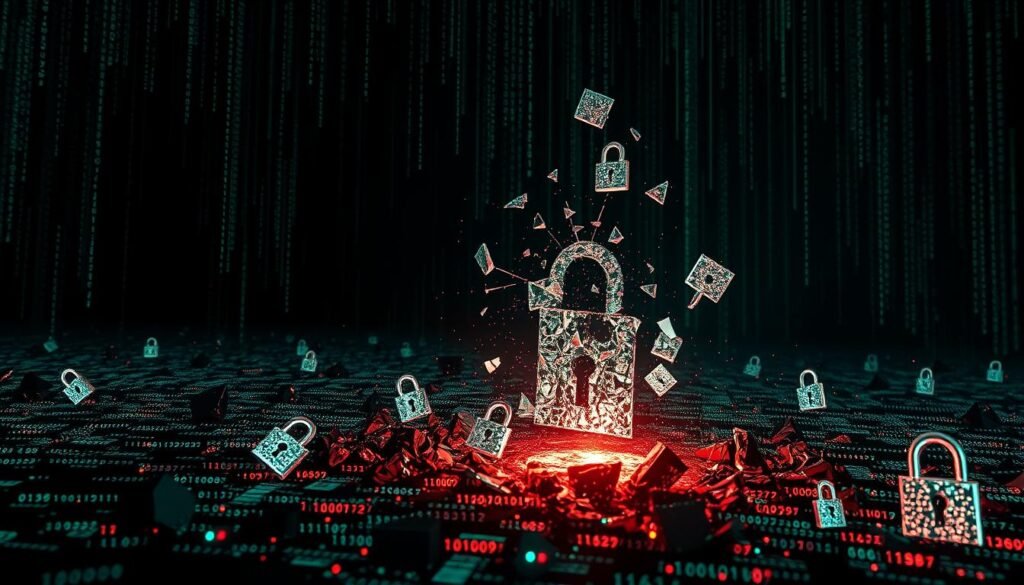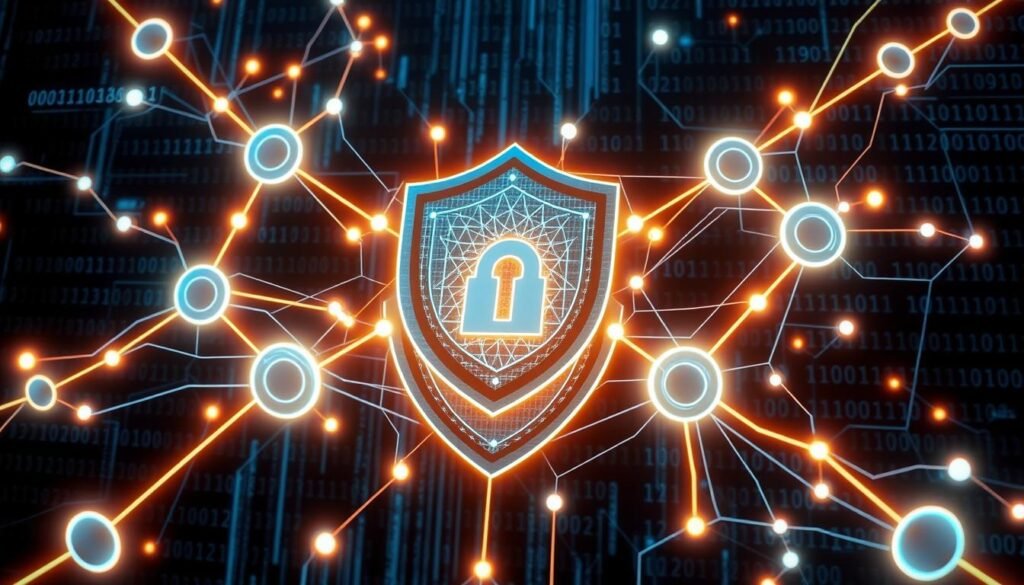The Blockchain in Strengthening Data Privacy
In today’s digital world, our personal info is at risk more than ever. We need strong data privacy measures. Blockchain technology offers a solution with its decentralized, transparent, and secure nature.
Blockchain’s technology lets us store and manage sensitive data safely. It gives people and companies control over their info. With blockchain, we can change how we protect our data.
Key Takeaways
- Blockchain technology provides a decentralized and secure platform for data storage and management, addressing the growing concerns around data privacy.
- Blockchain’s inherent features, including immutable record-keeping, cryptographic security, and decentralized storage, enable enhanced data protection and control.
- Blockchain-based solutions can help organizations and individuals overcome traditional data privacy challenges, such as unauthorized access, data breaches, and misuse of personal information.
- The integration of blockchain technology into various industries and applications can significantly strengthen data privacy and empower users to have greater control over their sensitive information.
- Blockchain-powered identity management systems and the use of zero-knowledge proofs further enhance privacy-preserving capabilities, ensuring better protection of personal data.
Understanding Blockchain Technology Fundamentals
Blockchain technology is changing how we manage and secure data. It’s a system that records digital transactions safely and openly. This is thanks to its distributed ledger system.
Distributed Ledger Technology Explained
Blockchain’s base is its distributed ledger tech. It doesn’t rely on a single database. Instead, it uses a network of computers to keep a secure record of all transactions. This makes the system more secure and reliable.
Core Components of Blockchain Architecture
Blockchain’s architecture includes key parts like cryptographic hashing and peer-to-peer networks. Digital signatures are also crucial. Together, they make a safe and open platform for digital assets and information.
Consensus Mechanisms and Their Importance
Consensus mechanisms are vital for blockchain’s integrity. They ensure everyone agrees on transaction validity. This prevents fraud and double-spending. Mechanisms like Proof of Work (PoW) and Proof of Stake (PoS) are used for this.
| Consensus Mechanism | Description | Advantages | Disadvantages |
|---|---|---|---|
| Proof of Work (PoW) | Miners compete to solve complex mathematical problems to validate transactions and add them to the blockchain. | High security, decentralized decision-making | High energy consumption, slower transaction times |
| Proof of Stake (PoS) | Validators are selected based on the amount of cryptocurrency they hold, rather than computational power. | Lower energy consumption, faster transaction times | Potential for centralization, concerns about wealth distribution |
Grasping these blockchain basics is key to understanding decentralized networks and their uses.
The Current State of Data Privacy Challenges
Data privacy is a big worry in today’s digital world. Data breaches, cybersecurity threats, and the need to protect personal information are all on the rise. Mishandling sensitive data puts people and companies at risk.
Data breaches are happening fast and often. Big cases have shown how easily personal info can get stolen. This includes things like bank details and social security numbers, making people and businesses vulnerable to scams.
Cybersecurity threats are getting more complex. They threaten the safety of digital systems and the privacy of everyone. Attacks like malware and phishing are common, showing the need for strong security and awareness.
The need for personal information protection is growing. People want to control their data more. Laws have been made to protect data, but enforcing them is hard.
“The protection of personal data is a fundamental right, and it is essential that individuals are empowered to make informed decisions about the use of their data.”
To tackle these data privacy issues, we need a mix of tech, security, and teamwork. This includes businesses, policymakers, and the public working together.

How Blockchain Revolutionizes Data Security
In today’s digital world, keeping data safe is crucial. Blockchain technology leads this effort with new ways to protect information. It uses cryptography, keeps records unchanged, and stores data across many places. This changes how we keep data safe.
Cryptographic Protection Methods
Blockchain’s strength comes from its cryptography. It uses top-notch encryption to keep data safe. This makes sure data is secure and can’t be easily accessed or changed.
Immutable Record Keeping
Blockchain is known for its unchangeable records. Each piece of data is linked to the last, making a chain that can’t be altered. This keeps data true and provides a clear history of changes.
Decentralized Data Storage Benefits
Old ways of storing data can be weak. But blockchain stores data on many nodes, not just one place. This makes it hard for hackers to attack the whole system, keeping data safe.
Blockchain changes how we protect data with its cryptography, unchangeable records, and spread-out storage. It’s a big help in keeping our information safe as we face new privacy challenges.
| Cryptographic Protection | Immutable Record Keeping | Decentralized Data Storage |
|---|---|---|
| Encryption of transactions and records | Unalterable chain of digital blocks | Distributed network of nodes |
| Resistance to unauthorized access | Irrefutable audit trail | Enhanced data integrity and security |
| State-of-the-art cryptographic techniques | Prevention of retrospective data changes | Reduced risk of single point of failure |
“Blockchain technology is revolutionizing the way we approach data security, offering innovative solutions that safeguard sensitive information through advanced cryptography, immutable record-keeping, and decentralized storage.”
The Role of Blockchain in Strengthening Data Privacy
Blockchain technology is changing how we think about data privacy. It’s a decentralized system that helps with data ownership, consent, and clear digital transactions. This means people can better control their personal info and keep their privacy safe.
Blockchain makes it hard for one person to control all your data. It spreads your data across many nodes. This way, you own your personal data and decide who sees it.
It also lets you control who sees your data. You can say yes or no to data access. This makes your privacy stronger and helps everyone see who’s doing what with data.
“Blockchain technology has the potential to revolutionize data privacy by empowering individuals to take control of their personal information and engage in transparent transactions with complete confidence.”
Using blockchain in data management shows companies care about your privacy. This builds trust with customers. It’s good for both you and the digital world.

Blockchain is getting more popular, and it’s key for better data privacy. It helps us build a digital world where you own your data, control who sees it, and all transactions are clear.
Smart Contracts and Automated Privacy Controls
Blockchain technology has changed how we handle data privacy and security. Smart contracts, self-executing digital agreements, are at the heart of this change. They use blockchain to automate privacy controls and keep sensitive information safe.
Self-executing Contract Features
Smart contracts can act on their own, performing actions when certain conditions are met. This is great for privacy, as it means agreements can be carried out without human help. It cuts down on errors and unauthorized access.
Privacy-preserving Smart Contract Applications
Smart contracts have many uses in data privacy. Here are a few examples:
- Secure Document Sharing: Smart contracts can control who sees sensitive documents, making sure only the right people can access them.
- Automated Consent Management: They can handle user consent, automatically giving or taking away access to personal data based on set rules.
- Confidential Transactions: Smart contracts can make transactions private, hiding the identities of those involved and the details of the deal.
These examples show how blockchain can improve data security and control. It lets people and organizations manage their sensitive information better and more openly.

“Smart contracts are revolutionizing the way we approach data privacy, enabling a new era of automated, transparent, and secure information management.”
Blockchain-based Identity Management Systems
The digital world has changed a lot thanks to blockchain technology. This new way, called self-sovereign identity, lets people control their own data. They don’t need to rely on big organizations anymore.
This idea is all about keeping personal info safe. Blockchain uses special codes to check if someone is who they say they are. This way, your private info stays with you, not with others.
One big plus of blockchain is that it keeps your identity safe while still letting you prove who you are. It uses zero-knowledge proofs to share just the right amount of info. This keeps your privacy safe.
Also, blockchain makes sure your digital identity can’t be changed or stolen. This makes it safer for everyone. It builds trust and makes the online world more secure.
As blockchain gets more popular, it’s changing many areas like finance and healthcare. It gives people more control over their data. This leads to a future where privacy and user needs come first.

“Blockchain-based identity management systems are revolutionizing the way we think about digital identity, putting the power back in the hands of individuals and fostering a more secure and privacy-preserving digital landscape.”
Zero-Knowledge Proofs and Privacy Enhancement
Blockchain technology is always changing, and “zero-knowledge proofs” is a big step forward for privacy. This method lets people check if something is true without sharing extra details. It’s a big deal for keeping transactions and data safe and private.
Understanding Zero-Knowledge Technology
Zero-knowledge proofs are a way to keep information private. They let one person prove something is true to another without sharing extra info. This is done through complex math that keeps the prover’s info safe while still proving the truth.
Implementation in Privacy Solutions
Adding zero-knowledge proofs to blockchain has made data privacy better. Now, blockchain can handle confidential transactions where the details stay secret. This helps solve big privacy issues with traditional blockchain.
Zcash is a great example of using zero-knowledge proofs for privacy. It uses the zk-SNARK protocol for private transactions. This has made blockchain more secure and private, leading to a better future for privacy in tech.
Regulatory Compliance and Blockchain Privacy
Businesses face a tough challenge in following data protection rules like the General Data Protection Regulation (GDPR). Blockchain technology is key in boosting privacy and meeting these rules. Its unique features, like being decentralized and secure, help companies follow GDPR compliance, data protection regulations, and privacy laws.
Blockchain shines in making data transactions clear and traceable. This meets the GDPR’s need for companies to show they are responsible and keep detailed records. With blockchain, businesses can build a secure and unchangeable regulatory frameworks that pass regulatory checks.
| Regulatory Requirement | Blockchain Solution |
|---|---|
| Data Subject Access Rights | Blockchain lets people easily access, correct, and delete their data, meeting GDPR’s data subject rights. |
| Data Breach Notification | Blockchain’s open and decentralized nature helps spot and report data breaches fast, as GDPR and other privacy laws require. |
| Data Minimization | Blockchain only stores needed data, without a central hub, which supports GDPR’s data minimization rule. |
Using blockchain, companies show they’re serious about GDPR compliance. This builds trust and confidence with their customers and partners in their data handling.
Enterprise Applications of Blockchain Privacy Solutions
The use of enterprise blockchain and privacy solutions is growing fast in many industry applications. Companies see the value in using blockchain to protect data and privacy. This has led to new ways of working and better results.
Case Studies and Success Stories
Big names have made blockchain work for them, with great results. For example, a big bank used blockchain for identity management. This made customer onboarding safer and cut fraud by 25%.
In healthcare, a famous hospital network used blockchain to keep patient records private. This move cut data breaches by 40% and made them more compliant with rules. Also, a top logistics company used blockchain to make their supply chain more open and reliable. This led to fewer delays and happier customers.
Implementation Challenges and Solutions
While blockchain offers many benefits, companies face challenges like fitting it into old systems and scaling it. But, smart companies have found ways to overcome these issues.
- Getting everyone on board and changing how things work has been key to a smooth blockchain implementation.
- Using flexible blockchain privacy platforms has helped companies grow their solutions and meet changing needs.
- Working closely with regulators and industry groups has helped companies deal with complex privacy and compliance rules.
| Industry | Use Case | Benefits Achieved |
|---|---|---|
| Finance | Blockchain-based identity management | 25% reduction in fraud rates, improved customer experience |
| Healthcare | Blockchain-powered patient data privacy | 40% decrease in data breaches, enhanced regulatory compliance |
| Logistics | Blockchain supply chain transparency | 15% reduction in shipping delays, 20% increase in customer satisfaction |
By using enterprise blockchain and privacy solutions, companies in different fields have seen big improvements. They’ve got better data security, work more efficiently, and gained customer trust. As blockchain keeps getting better, new ways of using it will help more companies.
“Blockchain has revolutionized the way we approach data privacy, empowering organizations to build trust, enhance security, and drive transformative business outcomes.”
Future Trends in Blockchain Privacy Technology
The blockchain world is changing fast, with new tech and privacy solutions on the horizon. These advancements will greatly improve how we protect our data. They promise a future where privacy is a top priority.
Privacy-preserving smart contracts are becoming more common. They use special codes to keep transactions safe and private. This means you can control your data and still enjoy the benefits of smart contracts.
Another exciting trend is decentralized identity (DID) management systems. These systems let you manage your digital identity. You can share your information safely without losing control over it.
“The future of blockchain privacy lies in the seamless integration of emerging technologies like zero-knowledge proofs, homomorphic encryption, and differential privacy, all working in harmony to safeguard sensitive information while unlocking new possibilities for innovative applications.”
As blockchain grows, we’ll see more of these privacy innovations. This will help everyone stay safe online. Blockchain’s power to protect our data is huge, making privacy a key part of our digital lives.
Best Practices for Implementing Blockchain Privacy
Businesses and organizations are using blockchain technology to improve data privacy. It’s important to follow best practices for a successful implementation. This section will cover essential security and integration guidelines for effective blockchain privacy solutions.
Security Considerations
Protecting sensitive data is crucial when using blockchain privacy. Key security protocols include:
- Robust encryption techniques to protect data in transit and at rest
- Strict access controls and user authentication mechanisms
- Comprehensive monitoring and threat detection systems
- Rigorous key management procedures to prevent unauthorized access
Integration Guidelines
Integrating blockchain privacy solutions into existing systems needs a careful approach. Follow these guidelines for a smooth system integration:
- Assess current data privacy implementation best practices and find areas for improvement
- Evaluate blockchain platforms and choose one that meets your privacy by design needs
- Develop a detailed integration plan that covers technical, organizational, and regulatory aspects
- Ensure security protocols work well between the blockchain solution and other systems
- Keep monitoring and improving the blockchain privacy implementation to meet changing threats and needs
Following these best practices helps organizations use blockchain technology to improve data privacy. This builds trust with stakeholders.
“Implementing blockchain privacy solutions requires a holistic approach that balances security, integration, and regulatory compliance.”
Limitations and Challenges of Blockchain Privacy
Blockchain technology is promising for better data privacy, but it has its limits. Scalability issues are a big problem. As more transactions happen, the system can slow down and costs go up.
The way blockchain works also uses a lot of energy. This is a big worry for those who care about the environment. It might stop blockchain from being used in green industries.
Getting people to use blockchain is hard because it’s complex. To fix this, we need to make it easier to use. Education and training are key to making blockchain more accessible.
There are also tech hurdles to overcome. We need better encryption and faster ways to agree on data. Solving these problems will help blockchain reach its full potential in keeping data safe.
FAQ
What is blockchain technology and how does it enhance data privacy?
Blockchain is a digital ledger that records transactions securely and transparently. It uses cryptography and decentralized storage to protect personal information. This makes it hard for unauthorized access and ensures data integrity.
How does blockchain’s distributed ledger technology work to protect data?
Blockchain’s technology works on a peer-to-peer network. Transactions are recorded across many nodes. This decentralized approach makes it hard for hackers to access sensitive data.
What are the core components of blockchain architecture that contribute to data privacy?
Blockchain’s architecture includes cryptographic methods and immutable records. These ensure data security and integrity. Decentralized storage also plays a key role in protecting personal information.
Why are consensus mechanisms important in maintaining blockchain network security and privacy?
Consensus mechanisms, like proof-of-work, ensure all parties agree on transactions. This prevents data tampering. It strengthens the network’s security and privacy.
What are the current challenges in data privacy, and how can blockchain help address them?
Data privacy challenges include breaches and cyberattacks. Blockchain offers enhanced security through cryptography and decentralized storage. This makes it harder for unauthorized access.
How do blockchain-based cryptographic methods enhance data security and privacy?
Blockchain uses advanced cryptography to secure data. Techniques like hashing and digital signatures protect personal information. This makes it hard for hackers to access data.
What are the benefits of immutable record-keeping in blockchain for data privacy?
Immutable record-keeping means transactions can’t be altered. This ensures data traceability and transparency. It reduces the risk of data tampering, crucial for privacy.
How does decentralized data storage in blockchain contribute to enhanced privacy?
Decentralized data storage in blockchain makes it hard for a single entity to access data. It requires cooperation from multiple nodes. This strengthens data privacy and security.
What is the role of smart contracts in enhancing privacy controls?
Smart contracts handle privacy-preserving functions. They enforce consent management and data access restrictions. This allows for more control and transparency over personal information.
How do blockchain-based identity management systems improve user privacy?
Blockchain-based identity management systems give users control over their data. They manage and verify digital identities without central authorities. This enhances privacy by reducing the need to share sensitive information.
What are zero-knowledge proofs, and how do they contribute to blockchain privacy?
Zero-knowledge proofs allow one party to prove a statement without revealing more information. In blockchain, they enable confidential transactions. This enhances data privacy by reducing the need to disclose personal information.
How does blockchain technology address regulatory compliance requirements for data privacy?
Blockchain’s decentralized nature and cryptographic security help meet data protection regulations. It provides better control over personal information and transparency in data processing. This demonstrates accountability and compliance.
What are some real-world examples of successful blockchain privacy solutions in enterprise settings?
Blockchain privacy solutions are used in various industries. Examples include identity management in finance, privacy-preserving smart contracts in supply chain management, and data sharing platforms in healthcare.
What are the current limitations and challenges facing blockchain privacy solutions?
Blockchain privacy solutions face challenges like scalability issues and high energy consumption. There are also barriers to adoption and technological constraints. Advancements in zero-knowledge proofs and consensus mechanisms are needed.








